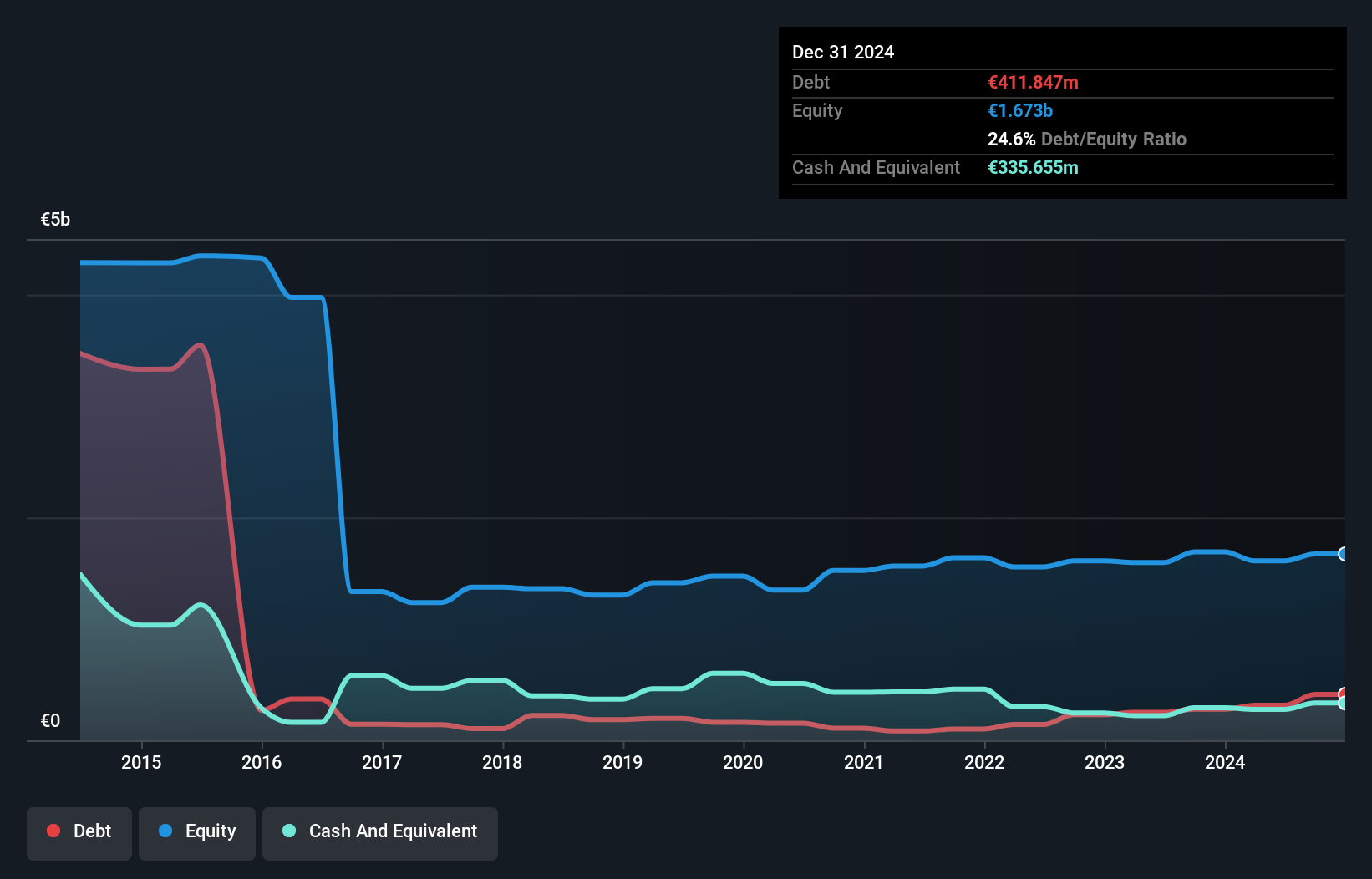David Iben put it well when he said, 'Volatility is not a risk we care about. What we care about is avoiding the permanent loss of capital.' So it might be obvious that you need to consider debt, when you think about how risky any given stock is, because too much debt can sink a company. Importantly, Italmobiliare S.p.A. (BIT:ITM) does carry debt. But the more important question is: how much risk is that debt creating?
What Risk Does Debt Bring?
Generally speaking, debt only becomes a real problem when a company can't easily pay it off, either by raising capital or with its own cash flow. In the worst case scenario, a company can go bankrupt if it cannot pay its creditors. While that is not too common, we often do see indebted companies permanently diluting shareholders because lenders force them to raise capital at a distressed price. By replacing dilution, though, debt can be an extremely good tool for businesses that need capital to invest in growth at high rates of return. When we think about a company's use of debt, we first look at cash and debt together.
What Is Italmobiliare's Debt?
You can click the graphic below for the historical numbers, but it shows that as of December 2024 Italmobiliare had €411.8m of debt, an increase on €278.7m, over one year. However, it also had €335.7m in cash, and so its net debt is €76.2m.

How Strong Is Italmobiliare's Balance Sheet?
We can see from the most recent balance sheet that Italmobiliare had liabilities of €510.0m falling due within a year, and liabilities of €233.2m due beyond that. Offsetting these obligations, it had cash of €335.7m as well as receivables valued at €386.5m due within 12 months. So it has liabilities totalling €21.1m more than its cash and near-term receivables, combined.
Having regard to Italmobiliare's size, it seems that its liquid assets are well balanced with its total liabilities. So it's very unlikely that the €1.08b company is short on cash, but still worth keeping an eye on the balance sheet.
View our latest analysis for Italmobiliare
We measure a company's debt load relative to its earnings power by looking at its net debt divided by its earnings before interest, tax, depreciation, and amortization (EBITDA) and by calculating how easily its earnings before interest and tax (EBIT) cover its interest expense (interest cover). Thus we consider debt relative to earnings both with and without depreciation and amortization expenses.
While Italmobiliare's low debt to EBITDA ratio of 0.48 suggests only modest use of debt, the fact that EBIT only covered the interest expense by 5.6 times last year does give us pause. So we'd recommend keeping a close eye on the impact financing costs are having on the business. Importantly, Italmobiliare grew its EBIT by 46% over the last twelve months, and that growth will make it easier to handle its debt. There's no doubt that we learn most about debt from the balance sheet. But it is future earnings, more than anything, that will determine Italmobiliare's ability to maintain a healthy balance sheet going forward. So if you're focused on the future you can check out this free report showing analyst profit forecasts.
Finally, a company can only pay off debt with cold hard cash, not accounting profits. So it's worth checking how much of that EBIT is backed by free cash flow. During the last three years, Italmobiliare burned a lot of cash. While that may be a result of expenditure for growth, it does make the debt far more risky.
Our View
Happily, Italmobiliare's impressive EBIT growth rate implies it has the upper hand on its debt. But we must concede we find its conversion of EBIT to free cash flow has the opposite effect. Looking at all the aforementioned factors together, it strikes us that Italmobiliare can handle its debt fairly comfortably. On the plus side, this leverage can boost shareholder returns, but the potential downside is more risk of loss, so it's worth monitoring the balance sheet. There's no doubt that we learn most about debt from the balance sheet. But ultimately, every company can contain risks that exist outside of the balance sheet. For example, we've discovered 1 warning sign for Italmobiliare that you should be aware of before investing here.
When all is said and done, sometimes its easier to focus on companies that don't even need debt. Readers can access a list of growth stocks with zero net debt 100% free, right now.
New: AI Stock Screener & Alerts
Our new AI Stock Screener scans the market every day to uncover opportunities.
• Dividend Powerhouses (3%+ Yield)
• Undervalued Small Caps with Insider Buying
• High growth Tech and AI Companies
Or build your own from over 50 metrics.
Have feedback on this article? Concerned about the content? Get in touch with us directly. Alternatively, email editorial-team (at) simplywallst.com.
This article by Simply Wall St is general in nature. We provide commentary based on historical data and analyst forecasts only using an unbiased methodology and our articles are not intended to be financial advice. It does not constitute a recommendation to buy or sell any stock, and does not take account of your objectives, or your financial situation. We aim to bring you long-term focused analysis driven by fundamental data. Note that our analysis may not factor in the latest price-sensitive company announcements or qualitative material. Simply Wall St has no position in any stocks mentioned.
About BIT:ITM
Italmobiliare
An investment holding company, owns and manages a portfolio of equity and other investments in the financial and industrial sectors in Italy and internationally.
Reasonable growth potential with mediocre balance sheet.
Market Insights
Community Narratives



